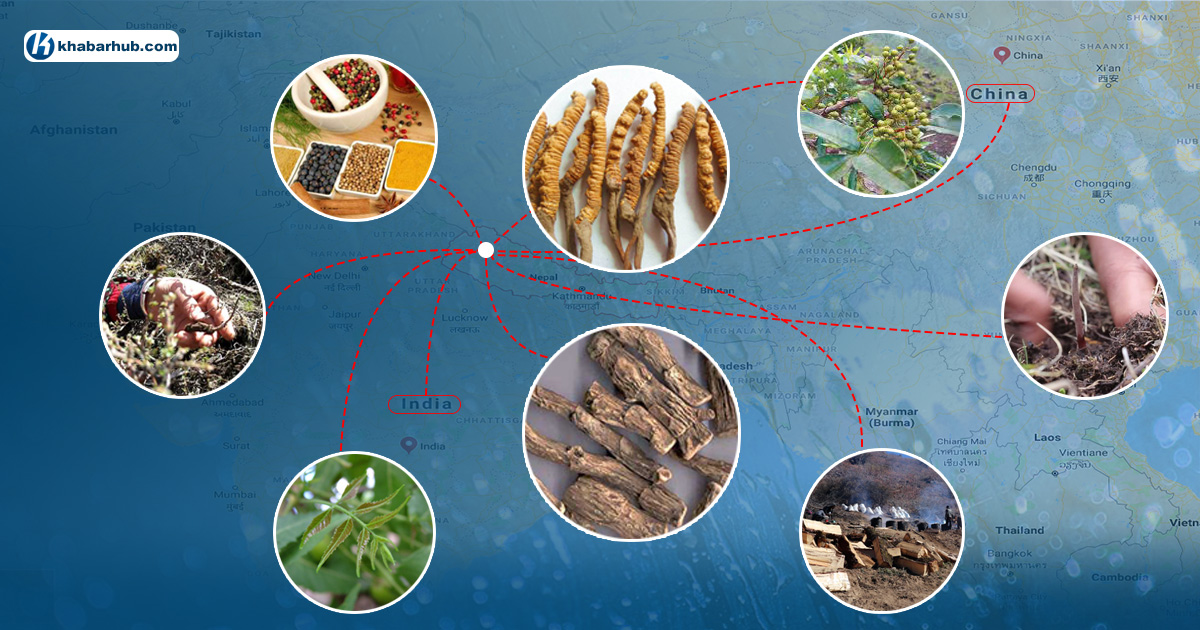0%
Around 7 hundred species of medicinal herbs are available in Nepal, according to a study conducted by the Department of Forests.

KATHMANDU: Smuggling of invaluable medicinal herbs continues unabated in Nepal.
Authorities have claimed that high demand for the rare medicinal herbs in the markets of India, China, and other countries has tempted smugglers towards this lucrative business.
Around 7 hundred species of medicinal herbs are available in Nepal, according to a study conducted by the Department of Forests.
These rare species of herbs are going to be extinct if not protected by the government. The unbridled smuggling has posed a serious threat to the herbs.
Ayurvedic pharmaceutical industries, including the government-owned Singha Durbar Vaidyakhana, have complained that they are facing a shortage of medicinal herbs in recent times.
Herbs worth Rs millions smuggled
The absence of effective monitoring has encouraged smugglers to smuggle these herbs.
On February 8, police arrested a person Sher Singh Dhami, 48, with 715 kilograms of Setak Chini, locally known as Khiraula, concealed in a house at Chainpur of Bajhang district. Dhami, who originally hails from Apihimal Rural Municipality, Dharchula, landed in police net while he was preparing to smuggle the herbs to India.
On October 30, a squad of Armed Police Force (APF), Kalabanjar seized 75 kilograms of spikenard (Jatamasi) from Duduwa Rural Municipality of Banke.
Similarly, on September 22, police rounded up Mane Rokaya with 1,012 kilograms of Setak Chini in Budhinanda Municipality of Bajura.
Rokaya had collected Setak Chini from a nearby jungle which is priced at Rs 1,600,000 per kilogram in the local market. He was held while he was preparing to smuggle it to India in cahoots.
Influential mafias, according to police, have a hand in smuggling. They, residing in India, smuggle Nepal’s herbs to various countries via India.
These incidents are only the tip of the iceberg. The statistics maintained by the Nepal Police has shown that herbs worth millions of rupees are seized annually.
Police seized herbs worth Rs 16.6 million from Karnali Province in the Fiscal Year 2017/18 alone. Likewise, various types of herbs were seized from Kalikot, Mugu, Rolpa, and Rukum while they were being smuggled to India.
SSP Uttam Raj Subedi, the spokesperson of Nepal Police, admits the smuggling of herbs to India through porous borders.
“Priceless herbs available in Nepal are mostly smuggled to India. Only small portions of the herbs are illegally sold in the third country,” said SSP Subedi.
Influential mafias, according to police, have a hand in smuggling. They, residing in India, smuggle Nepal’s herbs to various countries via India.
Herbs are seized when setting fails
Herbs are collected from Nepal’s hilly districts, including Kalikot, Mugu, Humla, Jumla, Dolpa, Jajarkot, Darchula, and Bhajhang. Locals collect herbs in cahoots with the forest officials, local representatives and police despite government’s ban on the collection of such herbs.
“Herbs are smuggled in cahoots with locals, local representatives and police,” an official at the Ministry of Forests and Environment told Khabarhub on the condition of anonymity.
The herbs are seized when a disgruntled police official informs the higher authority about it after he is deprived of his pie.
According to herbs trader, the herbs are seized when setting among the local representatives, forest officials and police fails.
Nepali pharmaceutical deprived of herbs
With the Nepal government’s ban on the collection of some certain herbs, Nepal pharmaceutical companies are facing the shortage of herbs, entrepreneurs said.
Government-owned Sindha Durbar Vaidyakhana Development Committee had called for a quotation seeking 91 items of herbs in the fiscal year 2016/17. However, only 40 items of herbs were made available.
A quotation seeking 300 kilograms of Hadchur had been announced in the fiscal year 2017/18.
Vaidyakhana has not been able to meet the demands of Ayurvedic medicines due to the shortage of herbs, said Hari Prasad Yadav, acting chief of Vaidyakhana Development Committee.
No conservation despite the ban
The government has not taken any initiation to protect invaluable herbs despite a ban imposed on their collection.
These rare species of herbs are going to be extinct if not protected by the government. The unbridled smuggling has posed a serious threat to the herbs.
Besides, fire, deforestation are the other causes leading to the disappearance of such priceless herbs.
“The government has to either bring concrete plans to protect these herbs or lift the ban on their collection,” said a trader.